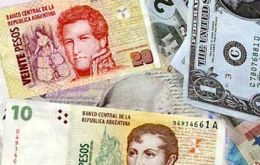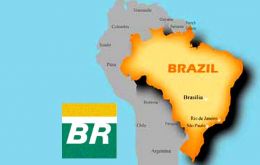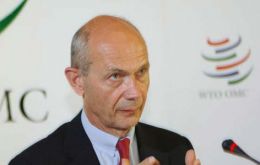MercoPress. South Atlantic News Agency
Economy
-
Wednesday, July 30th 2008 - 21:00 UTC
Argentines remain uneasy about domestic markets

During the second quarter of this year, an estimated 8.5 billion US dollars left Argentina, double the worst quarter in 2007 and higher than the most negative of private forecasts, according to the latest information from the Argentine Central Bank.
-
Wednesday, July 30th 2008 - 21:00 UTC
Japan suspends Chilean pork imports as precaution

Chile has called the Japanese ambassador in Santiago to express concern over Tokyo's decision to suspend imports of Chilean pork allegedly for sanitary reasons, according to reports in the Chilean media.
-
Wednesday, July 30th 2008 - 21:00 UTC
Petrobras, Latam's second largest corp., says Goldman Sachs

Brazil's government managed oil and gas corporation Petrobras is among the world's top five energy sector leaders and is the second biggest company in Latin America, according to studies published by Goldman Sachs and by América-Economía magazine.
-
Wednesday, July 30th 2008 - 21:00 UTC
Ban calls collapse of Doha round trade as “disappointing”
United Nations Secretary-General Ban Ki-moon voiced on Wednesday disappointment at the collapse of the Doha round of trade liberalization negotiations, expressing concern over the effect of the breakdown of the talks on developing nations.
-
Wednesday, July 30th 2008 - 21:00 UTC
Argentine electricity rates hiked in July from 10 to 30%

Faced with energy shortages after years of minimum investment, neglected maintenance and frozen rates the Argentine government announced this week electricity hikes to the tune of 10 to 30% for residential customers, the first since 2002.
-
Tuesday, July 29th 2008 - 21:00 UTC
Right moment for Montevideo port to become regional hub

The recurrent conflicts in Brazilian ports are having a direct impact on River Plate maritime traffic but the situation could be overcome if Montevideo expands its facilities and becomes a hub for the region, according to maritime agents.
-
Tuesday, July 29th 2008 - 21:00 UTC
IMF warns credit crunch is extending to the whole world
The global credit crunch shows no signs of abating, according to the International Monetary Fund (IMF). In its latest global financial stability report the IMF says that falling house prices and slowing economic growth are hitting credit.
-
Tuesday, July 29th 2008 - 21:00 UTC
Trade talks failure, seen as death kiss for multilateralism

Marathon talks in Geneva aimed at liberalizing global trade have collapsed admitted the head of the World Trade Organisation Pascal Lamy. Officials have blamed China, India and the US for failing to agree on import rules.
-
Monday, July 28th 2008 - 21:00 UTC
Uruguay brand beef shipped directly to EU consumers

By the end of the year Uruguay will be shipping beef directly to European Union consumers. The locally packed presentations will have all the traceability information plus the brand name with all the consumer data the supermarket wishes or has to comply with.
-
Monday, July 28th 2008 - 21:00 UTC
Uruguay record year for farm production and export

Farm production in Uruguay will consolidate its sixth year running of expansion, 66.5% since 2002, and farm exports are forecasted to reach 4.2 billion US dollars, a 51% increase over last year, according to a report from the Ministry of Agriculture Programming and Policies Office, OPYPA.
